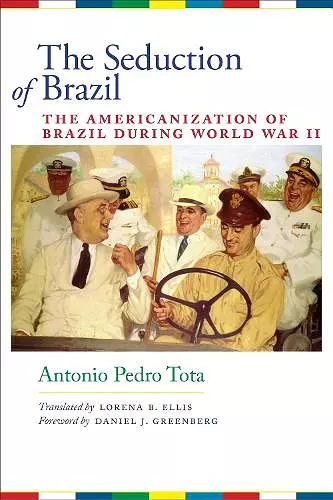The Seduction of Brazil
The Americanization of Brazil during World War II
Antonio Pedro Tota author Lorena B Ellis translator Daniel J Greenberg editor
Format:Paperback
Publisher:University of Texas Press
Published:1st Aug '09
Currently unavailable, and unfortunately no date known when it will be back

A study of how the Roosevelt administration used mass media, including films by such luminaries as John Ford, Walt Disney, and Orson Wells, to promote the American way of life to Brazilians and how Brazilians actively interpreted, negotiated, and reconfigured this effort a cultural seduction.
A fascinating study of how the Roosevelt administration used mass media, including films by such luminaries as John Ford, Walt Disney, and Orson Wells, to promote the American way of life to Brazilians and how Brazilians actively interpreted, negotiated, and reconfigured this effort at cultural seduction.
Following completion of the U.S. air base in Natal, Brazil, in 1942, U.S. airmen departing for North Africa during World War II communicated with Brazilian mechanics with a thumbs-up before starting their engines. This sign soon replaced the Brazilian tradition of touching the earlobe to indicate agreement, friendship, and all that was positive and good—yet another indication of the Americanization of Brazil under way during this period.
In this translation of O Imperialismo Sedutor, Antonio Pedro Tota considers both the Good Neighbor Policy and broader cultural influences to argue against simplistic theories of U.S. cultural imperialism and exploitation. He shows that Brazilians actively interpreted, negotiated, and reconfigured U.S. culture in a process of cultural recombination. The market, he argues, was far more important in determining the nature of this cultural exchange than state-directed propaganda efforts because Brazil already was primed to adopt and disseminate American culture within the framework of its own rapidly expanding market for mass culture. By examining the motives and strategies behind rising U.S. influence and its relationship to a simultaneous process of cultural and political centralization in Brazil, Tota shows that these processes were not contradictory, but rather mutually reinforcing.
The Seduction of Brazil brings greater sophistication to both Brazilian and American understanding of the forces at play during this period, and should appeal to historians as well as students of Latin America, culture, and communications.
ISBN: 9780292723528
Dimensions: unknown
Weight: 454g
216 pages